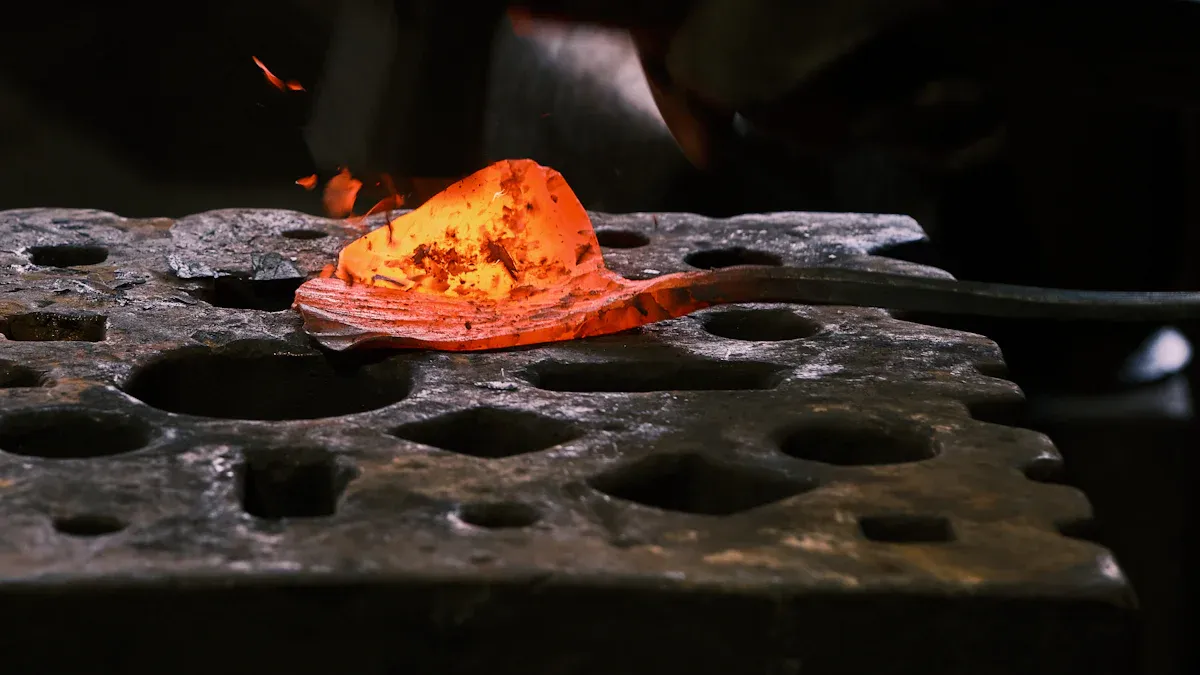
Forged steel blocks play a critical role in heavy-duty operations, offering unmatched strength and durability. Their ability to endure millions of load cycles without failure makes them indispensable in demanding environments. Compared to cast parts, forged components exhibit 26% greater tensile strength and 37% higher fatigue strength, resulting in a sixfold increase in fatigue life. This superior performance ensures reliability under extreme conditions. Rongli Forging Co., Ltd’s Forged Steel Block exemplifies these qualities, delivering precision-engineered solutions tailored to industry-specific needs.
Key Takeaways
- Forged steel blocks are very strong and long-lasting, making them important for tough jobs in industries like cars and airplanes.
- These blocks are 26% stronger and 37% better at handling stress than cast parts, so they work well in tough conditions.
- The forging process improves the grain structure, making parts that handle stress better and last longer.
- Forged steel blocks save money by needing less fixing and fewer replacements, giving businesses good value over time.
- They can be customized to fit different industry needs, improving how well they work and how efficient they are.
Unique Properties of Forged Steel Blocks
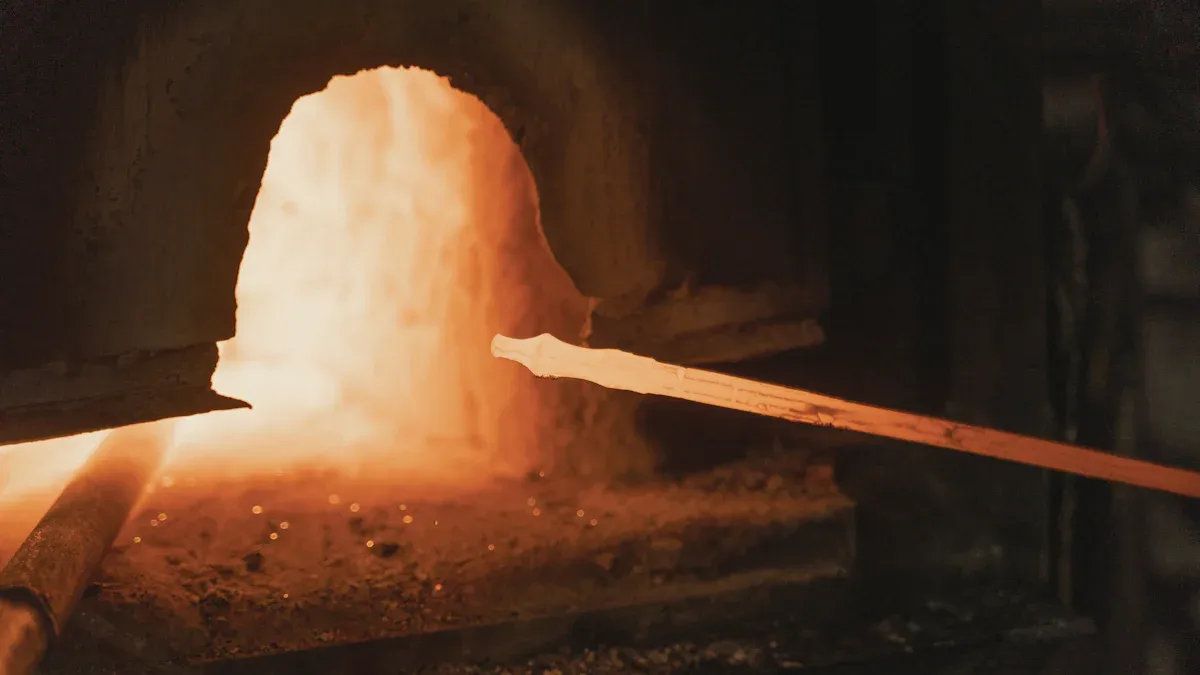
Superior Strength and Durability
Forged steel blocks are renowned for their exceptional strength and durability, making them a cornerstone in heavy-duty operations. The forging process enhances the material’s mechanical properties by refining its microstructure. This refinement reduces grain size, which strengthens the steel by hindering dislocation movement. As a result, forged steel components exhibit superior tensile strength compared to cast parts, with a 26% increase in performance.
Engineering tests further validate these properties. In automotive applications, forged steel components endure millions of load cycles without failure, showcasing their reliability under extreme conditions. The fatigue strength of forged steel, often measured at 50% of its tensile strength, highlights its ability to handle repetitive stress. This makes it an ideal choice for industries requiring high durability and strength, such as aerospace and automotive sectors.
Resistance to Stress and Fatigue
Forged steel blocks excel in resisting stress and fatigue, even under repetitive loading. Components like crankshafts and connecting rods, crafted from forged steel, demonstrate unmatched toughness in high-performance vehicles. These parts can withstand millions of load cycles without failure, ensuring reliability in demanding applications.
The forging process aligns the material’s grain structure with the geometry of the part, enhancing its ability to perform under stress. Forged parts also exhibit a 37% higher fatigue strength compared to other materials, resulting in a sixfold increase in fatigue life. This remarkable resistance to fatigue makes forged steel blocks indispensable for applications involving heavy loads and continuous operation.
Enhanced Grain Flow from Open Die Forging
Open die forging, a process employed by Rongli Forging Co., Ltd, significantly enhances the grain flow of forged steel blocks. This technique aligns the grain structure with the shape of the component, improving its mechanical properties. The refined grain flow not only increases strength but also enhances the block’s ability to resist stress and fatigue.
The open die forging process also allows for the production of steel blocks with closer-to-final dimensions, reducing the need for extensive machining. This precision ensures that each forged steel block meets the exact specifications required for its application. By optimizing grain flow and mechanical properties, open die forging delivers components that perform reliably in the most demanding environments.
Longevity in Harsh Environments
Forged steel blocks demonstrate exceptional longevity, even in the most demanding environments. Their ability to maintain structural integrity under extreme conditions makes them a preferred choice for industries requiring long-term reliability. The forging process enhances the material’s microstructure, resulting in components that resist wear, corrosion, and fatigue over extended periods.
Industries such as automotive, industrial machinery, and infrastructure rely on forged steel blocks for their unparalleled durability. These blocks endure millions of load cycles without failure, showcasing their resilience in high-stress applications. For example, in suspension bridge cables, forged steel supports enormous weights while resisting dynamic loads caused by environmental factors like wind and temperature fluctuations. The table below highlights the long-term performance of forged steel blocks across various applications:
| Application | Evidence of Longevity |
|---|---|
| Automotive | Forged steel components can withstand millions of load cycles without failure. |
| Industrial Machinery | Fatigue strength is often measured at 50% of its tensile strength, ensuring durability. |
| Infrastructure | Used in suspension bridge cables to support enormous weights and resist dynamic loads. |
The open die forging process further enhances the longevity of these blocks. By aligning the grain structure with the component’s geometry, this technique improves resistance to stress and fatigue. Additionally, the heat treatment applied during manufacturing ensures that each block can withstand harsh operational environments, including extreme temperatures and pressures.
Rongli Forging Co., Ltd’s forged steel blocks exemplify this durability. Their rigorous inspection protocols guarantee that every block meets the highest standards of quality and performance. This commitment to excellence ensures that forged steel blocks remain a cornerstone of heavy-duty operations, delivering unmatched longevity and reliability.
Advantages in Heavy-Duty Applications
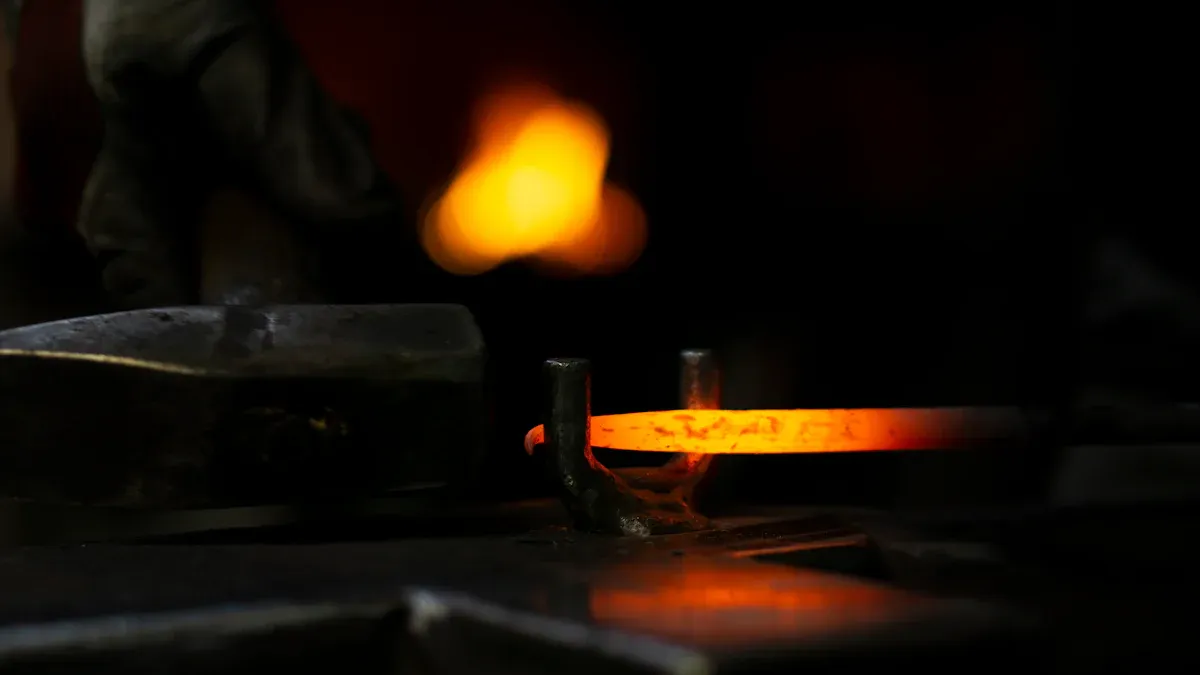
Withstanding Extreme Pressure and Temperature
Forged steel blocks excel in environments where extreme pressure and temperature are constant challenges. Their superior mechanical properties, such as high tensile strength and fatigue resistance, make them ideal for heavy-duty applications. The forging process refines the steel’s microstructure, creating smaller grains that enhance both strength and toughness. This refinement ensures that the material can endure dynamic loads without failure, even under the harshest conditions.
Industries like oil and gas exploration rely on forged steel blocks to maintain structural integrity in high-pressure pipelines and drilling equipment. Similarly, aerospace applications demand materials that can withstand rapid temperature fluctuations and intense mechanical stress. Forged steel blocks meet these requirements with unmatched reliability, ensuring safety and performance in critical operations.
Cost-Effectiveness and Long-Term Value
Forged steel blocks offer exceptional cost-effectiveness by combining durability with long-term performance. While the initial cost may be higher than alternative materials, their extended lifespan and reduced maintenance requirements result in significant savings over time. For example, in high-stress applications, forged steel outperforms cast iron, which is less durable and requires frequent replacements.
| Material | Cost per Ton | Durability and Performance |
|---|---|---|
| Forged Steel | $2,500 | Long-term durability and performance in high-stress applications |
| Cast Iron | $400 | Cost-effective for less demanding environments |
This economic advantage makes forged steel blocks a preferred choice for industries seeking to optimize operational costs without compromising quality. Their ability to withstand wear and tear over extended periods ensures that businesses achieve a higher return on investment.
Reduced Risk of Operational Failures
Operational failures in heavy-duty industries can lead to costly downtime and safety hazards. Forged steel blocks minimize these risks by delivering superior toughness and fatigue resistance. The forging process aligns the grain structure with the component’s geometry, enhancing its ability to handle repetitive stress and dynamic loads.
Applications in automotive and industrial machinery highlight this advantage. In high-performance vehicles like Formula 1 cars, forged steel components endure millions of load cycles without failure. Similarly, industrial machinery benefits from forged steel’s fatigue strength, which is measured at 50% of its tensile strength. This ensures long-term reliability in high-stress environments.
| Application | Advantage of Forged Steel |
|---|---|
| Automotive | Superior toughness and fatigue resistance in high-performance vehicles, such as Formula 1 cars, allowing components to withstand millions of load cycles without failure. |
| Industrial Machinery | Fatigue strength measured at 50% of tensile strength, ensuring long-term performance in high-stress environments. |
| Infrastructure | Structural integrity in applications like bridges and cranes, supporting enormous weights and resisting dynamic loads over time. |
By reducing the likelihood of failures, forged steel blocks enhance safety and operational efficiency, making them indispensable for critical applications.
Customization for Industry-Specific Needs
Forged steel blocks offer unparalleled flexibility in meeting the unique demands of various industries. Manufacturers like Rongli Forging Co., Ltd specialize in tailoring these blocks to precise specifications, ensuring optimal performance for specific applications. This customization capability allows industries to address operational challenges effectively while enhancing efficiency and reliability.
The open die forging process plays a pivotal role in enabling customization. By shaping the steel to exact dimensions, this method ensures that each block aligns with the intended application. Additionally, the ability to select from a wide range of materials, including carbon steel, alloy steel, and stainless steel, provides industries with the freedom to choose the most suitable option for their needs. Heat treatment and rough machining further refine the blocks, making them ready for immediate use or further processing.
Several industries have already benefited from customized forged steel blocks:
- Metal Processing: A traditional universal joint was replaced with a forged cross and needle-bearing joint. This customization resolved overheating issues, increased torque capacity, and delivered a low-maintenance solution for high-speed applications.
- Aerospace: Forged steel blocks tailored for landing gear components withstand extreme stress and temperature fluctuations, ensuring safety and durability.
- Oil and Gas: Custom blocks designed for drilling equipment enhance resistance to wear and corrosion, extending operational life in harsh environments.
Customization not only improves performance but also reduces operational costs. Tailored solutions minimize the need for frequent replacements and maintenance, offering long-term value. Rongli Forging Co., Ltd’s expertise in open die forging ensures that every forged steel block meets the highest standards of precision and quality, making them indispensable for industry-specific applications.
Key Industries and Use Cases
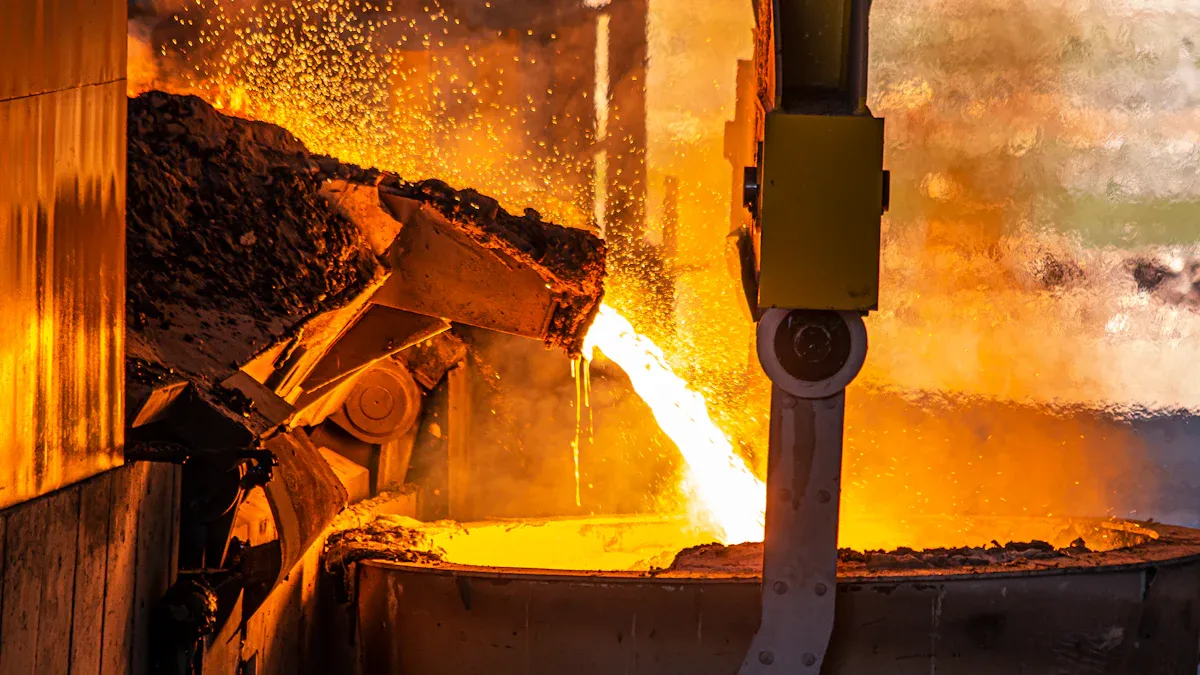
Construction and Infrastructure Projects
Forged steel blocks play a pivotal role in construction and infrastructure projects due to their unmatched strength and structural integrity. These blocks are essential in applications such as bridges, cranes, and pressure vessels, where durability and reliability are critical. Suspension bridge cables, for instance, rely on forged steel to support enormous weights and resist dynamic loads over extended periods.
The forging process eliminates the need for welding, which shortens production time and enhances the component’s ability to withstand harsh field conditions. Proper grain flow orientation in forged steel ensures maximum fatigue resistance, making it ideal for demanding applications. This combination of strength, longevity, and manufacturing efficiency reduces rework and increases part life, delivering significant economic and quality benefits to the construction industry.
Oil and Gas Exploration and Production
The oil and gas industry demands materials that can endure extreme pressures and temperatures. Forged steel blocks meet these requirements, making them indispensable for critical applications such as valves, fittings, and pumps. Their strength and durability help prevent equipment failures, reducing the risk of costly repairs and accidents.
Customization further enhances their utility in this sector. Forged components can be tailored to meet specific application needs, ensuring a secure fit and minimizing leakage risks. This adaptability, combined with their ability to withstand harsh operational environments, makes forged steel blocks a reliable choice for oil and gas exploration and production.
Manufacturing and Heavy Machinery
Manufacturing and heavy machinery industries benefit significantly from the use of forged steel blocks. These blocks are preferred for heavy-duty gears and shafts due to their long-term performance in high-stress environments. The fatigue strength of forged steel, often measured at 50% of its tensile strength, highlights its ability to withstand repetitive stress.
The durability of forged steel blocks ensures that industrial machines operate efficiently over extended periods, minimizing downtime and maintenance costs. Their superior mechanical properties make them a cornerstone in the manufacturing sector, where reliability and performance are paramount.
| Industry | Description |
|---|---|
| Automotive | Utilizes forged components for vehicle parts. |
| Aerospace and Defense | Requires high-strength materials for safety. |
| Railway | Uses forged blocks for durability in trains. |
| Industrial Machinery | Employs forged steel for heavy machinery parts. |
The versatility and performance of forged steel blocks make them indispensable across these industries, ensuring safety, efficiency, and cost-effectiveness.
Aerospace and Defense Applications
The aerospace and defense industries demand materials that can endure extreme conditions while maintaining structural integrity. Forged steel blocks meet these requirements with their exceptional strength, fatigue resistance, and adaptability. These qualities make them indispensable for critical components in aircraft, spacecraft, and military equipment.
In aerospace, forged steel blocks are used to manufacture landing gear, engine mounts, and structural components. These parts must withstand high stress, rapid temperature changes, and intense mechanical loads. The forging process enhances the steel’s grain structure, ensuring superior performance under such conditions. For example, landing gear components crafted from forged steel can endure the immense forces generated during takeoff and landing, ensuring passenger safety.
Defense applications also benefit from the unmatched durability of forged steel blocks. Military vehicles, naval ships, and weapon systems rely on forged components for their ability to resist wear and impact. Tanks and armored vehicles use forged steel for their chassis and suspension systems, providing the strength needed to navigate rugged terrains. Similarly, naval vessels incorporate forged steel blocks in their propulsion systems, ensuring reliability during extended missions.
Note: The customization capabilities of forged steel blocks allow manufacturers to tailor components to specific aerospace and defense requirements. This ensures optimal performance and safety in mission-critical applications.
| Application | Benefits of Forged Steel Blocks |
|---|---|
| Landing Gear | Withstands high stress and temperature fluctuations. |
| Military Vehicles | Provides durability and impact resistance in harsh terrains. |
| Naval Propulsion | Ensures reliability and longevity during extended missions. |
Rongli Forging Co., Ltd’s expertise in open die forging ensures that each steel block meets the stringent standards of these industries. Their commitment to precision and quality makes forged steel blocks a trusted choice for aerospace and defense applications.
Comparison to Alternative Materials
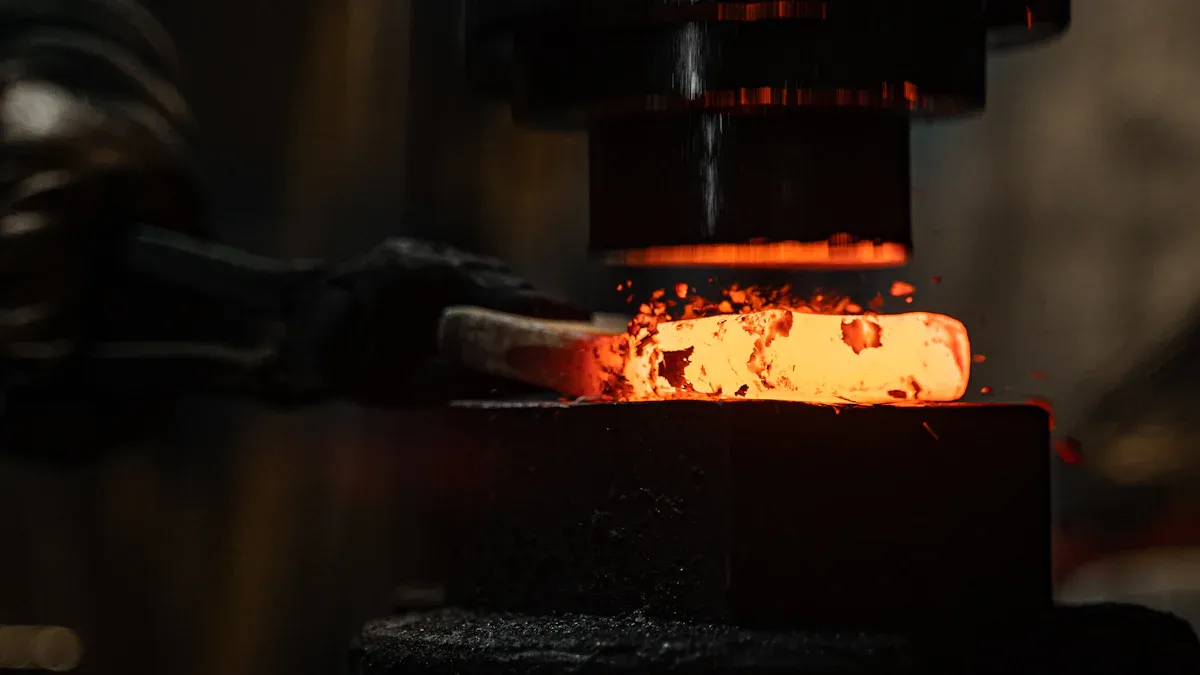
Forged Steel Block vs. Cast Steel
Forged steel blocks outperform cast steel in strength, durability, and reliability. The forging process refines the grain structure, creating a denser and more uniform material. This refinement enhances tensile strength and fatigue resistance, making forged steel blocks ideal for high-stress applications. In contrast, cast steel often contains internal voids or porosity due to the casting process, which can compromise its structural integrity.
Forged steel blocks also exhibit superior toughness. They resist impact and stress better than cast steel, which is more prone to cracking under dynamic loads. Additionally, the forging process eliminates defects commonly found in cast steel, such as shrinkage cavities and inclusions. These advantages make forged steel blocks a preferred choice for industries requiring long-term reliability and performance.
Forged Steel Block vs. Fabricated Steel
When compared to fabricated steel, forged steel blocks offer significant advantages in strength, durability, and manufacturing efficiency. Fabricated steel involves welding and assembly, which introduces weak points and increases the risk of failure under stress. Forged steel blocks, on the other hand, are crafted from a single piece of material, ensuring uniformity and eliminating weld seams.
The table below highlights key performance metrics:
| Metric | Forged Steel | Fabricated Steel |
|---|---|---|
| Strength | High tensile strength | Lower tensile strength |
| Durability | Superior durability | Moderate durability |
| Fatigue Resistance | Excellent | Variable |
| Manufacturing Complexity | Less complex | More complex |
This comparison underscores the reliability and efficiency of forged steel blocks in heavy-duty operations. Their ability to withstand extreme conditions without failure makes them indispensable for critical applications.
Advantages Over Other Alloys
Forged steel blocks surpass other alloys in industrial applications due to their exceptional mechanical properties. Key advantages include:
- Superior Strength: They exhibit greater strength than cast iron, making them suitable for high-performance environments.
- Fatigue Resistance: Forged steel blocks endure millions of load cycles without failure, ensuring reliability in automotive and aerospace sectors.
- Refined Grain Structure: The forging process produces a uniform grain structure, enhancing durability under stress.
Additional benefits include:
- Increased Toughness: Forged steel resists fractures under impact, making it ideal for dynamic loads.
- Elimination of Defects: The forging process minimizes internal defects, resulting in a more reliable material.
- Heat Treatment Compatibility: Forged steel can undergo heat treatment to achieve tailored properties like increased hardness.
These attributes make forged steel blocks a superior choice for industries demanding strength, durability, and adaptability.
Environmental and Economic Benefits
Forged steel blocks offer significant environmental and economic advantages, making them a sustainable and cost-effective choice for heavy-duty operations. Their production process and material properties contribute to reduced environmental impact and long-term savings.
Environmental Advantages
Forged steel blocks demonstrate high recyclability, which minimizes waste and conserves natural resources. Unlike casting, forging consumes less energy, resulting in lower greenhouse gas emissions. This energy efficiency aligns with global sustainability goals and reduces the carbon footprint of manufacturing processes. Additionally, the forging process generates minimal waste compared to casting, which often produces excess material that cannot be reused.
| Material | Recyclability | Carbon Footprint | Energy Consumption |
|---|---|---|---|
| Forged Steel | High | Lower | Moderate |
| Cast Iron | High | Higher | High |
The forging industry has also adopted sustainability initiatives to further mitigate environmental impacts. These efforts include optimizing energy use, reducing emissions, and recycling scrap materials. By choosing forged steel blocks, industries can contribute to a greener future while maintaining operational efficiency.
Economic Benefits
The durability and longevity of forged steel blocks translate into substantial cost savings over time. Their superior strength reduces the need for frequent replacements, lowering maintenance expenses. Industries benefit from fewer operational disruptions, which enhances productivity and profitability.
- Forging consumes less energy than casting, reducing production costs.
- Casting generates substantial waste, increasing material expenses.
- Long-lasting forged steel blocks minimize downtime and replacement costs.
These economic benefits make forged steel blocks a smart investment for industries seeking to balance performance with sustainability. Their ability to deliver long-term value while supporting environmental goals underscores their importance in modern heavy-duty operations.
Forged steel blocks have become essential in heavy-duty operations due to their unmatched strength, durability, and reliability. Industries such as automotive, industrial machinery, and infrastructure rely on these components for their ability to perform under extreme conditions. Their superior fatigue resistance ensures long-term reliability, even in high-stress environments.
The table below highlights the benefits and reliability of forged steel blocks across various applications:
| Application | Benefits | Reliability Evidence |
|---|---|---|
| Automotive | Superior toughness and fatigue resistance | Can withstand millions of load cycles without failure, especially in high-performance vehicles like Formula 1 cars. |
| Industrial Machinery | Long-term performance in high-stress environments | Fatigue strength often measured at 50% of tensile strength, ensuring it handles repetitive stress. |
| Infrastructure | Structural integrity for heavy loads | Used in suspension bridge cables to support enormous weights and resist dynamic loads over long periods. |
Investing in forged steel blocks ensures operational safety, efficiency, and cost-effectiveness. Their ability to deliver consistent performance makes them the ideal choice for industries that demand excellence.
FAQ
What makes forged steel blocks superior to cast steel?
Forged steel blocks exhibit refined grain structures, enhancing strength and fatigue resistance. Cast steel often contains voids or porosity, compromising reliability. Industries prefer forged steel for its ability to endure extreme conditions without failure, ensuring long-term performance in heavy-duty applications.
Can forged steel blocks be customized for specific industries?
Manufacturers like Rongli Forging Co., Ltd tailor forged steel blocks to meet precise specifications. Open die forging enables customization in dimensions, material selection, and heat treatment. This flexibility ensures optimal performance across industries such as aerospace, oil and gas, and construction.
How do forged steel blocks contribute to sustainability?
Forged steel blocks minimize waste through high recyclability and energy-efficient production. The forging process consumes less energy than casting, reducing greenhouse gas emissions. Industries benefit from durable components that lower maintenance needs, aligning with environmental and economic goals.
What industries benefit most from forged steel blocks?
Key industries include aerospace, automotive, oil and gas, and construction. Forged steel blocks provide unmatched strength, fatigue resistance, and reliability. Applications range from landing gear and drilling equipment to suspension bridge cables, ensuring safety and efficiency in critical operations.
Are forged steel blocks cost-effective in the long term?
Forged steel blocks offer durability that reduces replacement and maintenance costs. Their ability to withstand extreme conditions ensures fewer operational disruptions. While initial costs may be higher, their extended lifespan delivers significant savings, making them a smart investment for heavy-duty industries.
Post time: Mar-19-2025



